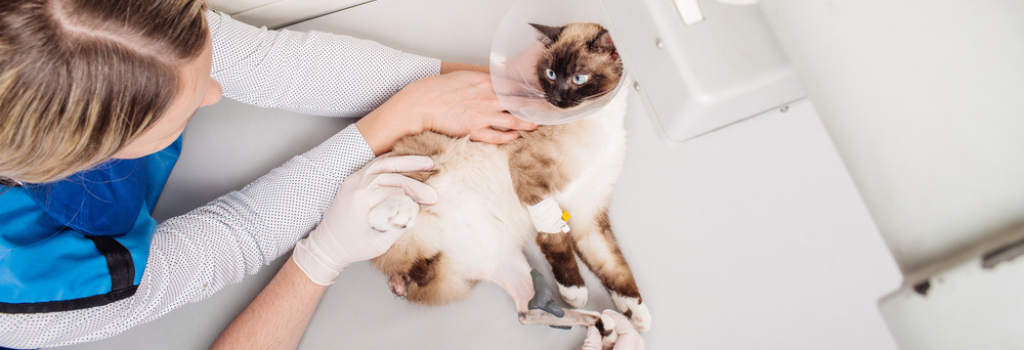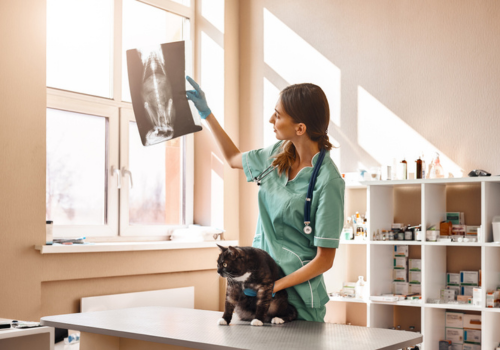Just like people, cats often need to undergo various tests when suffering from an illness or injury. Diagnostic imaging is a huge part of veterinary medicine, and it allows us to figure out what is happening inside our patients’ bodies. This is extremely important since cats obviously cannot speak for themselves and tell us what’s wrong. When it comes to something as crucial as cat diagnostic imaging, your veterinarian is the best person to turn to for information. Here at Crescenta Cañada Pet Hospital, we understand that you need accurate information so you can do what’s best for your feline friend. That’s why we decided to create this resource to answer some of the most frequently asked questions about diagnostic imaging. It’s essential to be able to know when your cat is in pain, as felines can be particularly stoic.
We still encourage you to consult with your own veterinarian if you have questions about your cat’s health. If you don’t have a veterinarian and are searching for one in La Crescenta, CA, we’d love to help. Call (818) 248-3963 to schedule an appointment.
What is cat diagnostic imaging?
Diagnostic imaging is the use of images to diagnose a disease process or injury. In some instances, we also run tests to monitor a cat’s ongoing health as a part of their routine wellness care and to look for early warning signs of trouble. These tests are completely painless and typically non-invasive. As veterinarians, we rely on several different types of diagnostic imaging when determining what’s going on with a patient.
Diagnostic imaging tests for cats include:
- Ultrasound
- X-ray
- MRI
- CT scans (Also known as cat scans)
These technologies provide us with the information we need to diagnose conditions and begin appropriate treatment promptly. In most cases, we can determine what’s going on with your pet using x-rays or ultrasounds. MRIs and CT scans cost substantially more, so we use them less frequently.

How does the use of diagnostic imaging help veterinarians identify health issues in my cat?
Diagnostic imaging serves several purposes and helps us identify health issues in cats in several ways. For example, x-rays allow us to diagnose broken bones or count the number of fetuses in pregnant cats. On the other hand, we use ultrasound to examine fluid-filled organs, such as the kidneys, liver, or heart. Overall, diagnostic imaging allows us to safely peer deep inside your pet’s body to identify health issues.
What are some possible conditions that are diagnosed using cat x-rays?
We use x-rays to diagnose numerous health conditions in cats.
X-rays help us detect a wide range of issues, including:
- Broken bones
- Cancerous tumors
- Periodontal disease
- Tooth damage
- Intestinal blockages
- Bowel obstructions
- Bladder stones
- Pregnancy

How will a veterinarian decide that a cat needs diagnostic imaging?
We determine when a cat needs diagnostic imaging based on several factors. If you bring your cat in with a limp, we will recommend an x-ray. If they have a suspicious lump in their abdomen, we may recommend an x-ray or ultrasound.
As your cat’s veterinarian, we will carefully examine them and discuss their condition with you to determine what types of testing they need. Unfortunately, your cat cannot tell us what’s wrong or what hurts. Instead, we have to rely on diagnostic tests to figure out what’s going on when there is a problem.
Why is early detection and diagnosis of health problems in my cat so important?
Early detection and diagnosis are always crucial when it comes to injuries and health problems involving your cat. Whether it’s dental disease, a severe wound, a broken bone, or something else, the faster we detect and diagnose it, the sooner we can begin treatment. Determining where the problem is stemming from early on yields the best possible prognosis for your feline friend.
If you still have questions about cat diagnostic imaging, we’d love to help. Send an email to [email protected] or call (818) 248-3963 to learn more or schedule an appointment for your cat.

